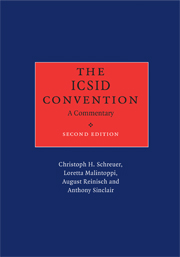Book contents
- Frontmatter
- Contents
- Foreword by Professor Sir Elihu Lauterpacht, CBE, QC
- Authors' preface to the second edition
- Table of cases
- List of abbreviations
- Text of the ICSID Convention
- Procedural calendar
- PREAMBLE
- CHAPTER I International Centre for Settlement of Investment Disputes
- CHAPTER II Jurisdiction of the Centre
- Article 25 Jurisdiction
- Article 26 Exclusive Remedy
- Article 27 Diplomatic Protection
- CHAPTER III Conciliation
- CHAPTER IV Arbitration
- CHAPTER V Replacement and Disqualification of Conciliators and Arbitrators
- CHAPTER VI Cost of Proceedings
- CHAPTER VII Place of Proceedings
- CHAPTER VIII Disputes between Contracting States
- CHAPTER IX Amendment
- CHAPTER X Final Provisions
- Final Clause
- Consolidated bibliography
- Index by article
- Index by subject
Article 27 - Diplomatic Protection
from CHAPTER II - Jurisdiction of the Centre
Published online by Cambridge University Press: 07 September 2010
- Frontmatter
- Contents
- Foreword by Professor Sir Elihu Lauterpacht, CBE, QC
- Authors' preface to the second edition
- Table of cases
- List of abbreviations
- Text of the ICSID Convention
- Procedural calendar
- PREAMBLE
- CHAPTER I International Centre for Settlement of Investment Disputes
- CHAPTER II Jurisdiction of the Centre
- Article 25 Jurisdiction
- Article 26 Exclusive Remedy
- Article 27 Diplomatic Protection
- CHAPTER III Conciliation
- CHAPTER IV Arbitration
- CHAPTER V Replacement and Disqualification of Conciliators and Arbitrators
- CHAPTER VI Cost of Proceedings
- CHAPTER VII Place of Proceedings
- CHAPTER VIII Disputes between Contracting States
- CHAPTER IX Amendment
- CHAPTER X Final Provisions
- Final Clause
- Consolidated bibliography
- Index by article
- Index by subject
Summary
INTRODUCTION
Diplomatic protection is a concept of customary international law whereby a State espouses the claim of its national against another State and pursues it in its own name. It was developed as a consequence of the non-availability of international remedies to individuals and corporations under traditional international law. Diplomatic protection depends on a number of conditions. The individual's or corporation's nationality of the protecting State must be established. This bond of nationality must have existed continuously from the time of the injury until the claim is made or, according to some, until the claim is settled. There must have been a wrongful act under international law on the part of the State against which diplomatic protection is to be exercised. The legal remedies in the State that has allegedly committed the violation must have been exhausted by the individual or corporation concerned.
In addition to these stringent legal requirements, a number of political factors reduce the usefulness of this device to the private party. The individual or corporation has no right to diplomatic protection under international law but depends on the political discretion of his government. The government may refuse to take up the claim. It may discontinue diplomatic protection at any time. It may waive the national's claim or agree to a reduced settlement. As soon as a State has taken up the claim of its national, the claim becomes part of the foreign policy process with all the attendant political risks.
- Type
- Chapter
- Information
- The ICSID ConventionA Commentary, pp. 414 - 430Publisher: Cambridge University PressPrint publication year: 2009



